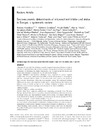Please use this identifier to cite or link to this item:
https://accedacris.ulpgc.es/jspui/handle/10553/74043
| Title: | Review Article Socio-economic determinants of micronutrient intake and status in Europe: A systematic review | Authors: | Novaković, Romana Cavelaars, Adriënne Geelen, Anouk Nikolić, Marina Altaba, Iris Iglesia Viñas, Blanca Roman Ngo, Joy Golsorkhi, Mana Medina, Marisol Warthon Brzozowska, Anna Szczecinska, Anna De Cock, Diederik Vansant, Greet Renkema, Marianne Serra Majem, Luis Moreno, Luis Aznar Glibetić, Maria Gurinović, Mirjana Van'T Veer, Pieter De Groot, Lisette C.P.G.M. |
UNESCO Clasification: | 3206 Ciencias de la nutrición | Keywords: | Europe Eurreca Micronutrient Intake/Status Socio-Economic |
Issue Date: | 2014 | Journal: | Public Health Nutrition | Abstract: | Objective To provide the evidence base for targeted nutrition policies to reduce the risk of micronutrient/diet-related diseases among disadvantaged populations in Europe, by focusing on: folate, vitamin B12, Fe, Zn and iodine for intake and status; and vitamin C, vitamin D, Ca, Se and Cu for intake. Design MEDLINE and Embase databases were searched to collect original studies that: (i) were published from 1990 to 2011; (ii) involved >100 subjects; (iii) had assessed dietary intake at the individual level; and/or (iv) included best practice biomarkers reflecting micronutrient status. We estimated relative differences in mean micronutrient intake and/or status between the lowest and highest socio-economic groups to: (i) evaluate variation in intake and status between socio-economic groups; and (ii) report on data availability. Setting Europe. Subjects Children, adults and elderly. Results Data from eighteen publications originating primarily from Western Europe showed that there is a positive association between indicators of socio-economic status and micronutrient intake and/or status. The largest differences were observed for intake of vitamin C in eleven out of twelve studies (5-47 %) and for vitamin D in total of four studies (4-31 %). Conclusions The positive association observed between micronutrient intake and socio-economic status should complement existing evidence on socio-economic inequalities in diet-related diseases among disadvantaged populations in Europe. These findings could provide clues for further research and have implications for public health policy aimed at improving the intake of micronutrients and diet-related diseases. Copyright © The Authors 2013. | URI: | https://accedacris.ulpgc.es/handle/10553/74043 | ISSN: | 1368-9800 | DOI: | 10.1017/S1368980013001341 | Source: | Public Health Nutrition[ISSN 1368-9800],v. 17 (5), p. 1031-1045, (Enero 2014) |
| Appears in Collections: | Reseña |
SCOPUSTM
Citations
95
checked on Jun 8, 2025
WEB OF SCIENCETM
Citations
88
checked on Feb 8, 2026
Page view(s)
46
checked on Jan 11, 2026
Download(s)
65
checked on Jan 11, 2026
Google ScholarTM
Check
Altmetric
Share
Export metadata
Items in accedaCRIS are protected by copyright, with all rights reserved, unless otherwise indicated.
